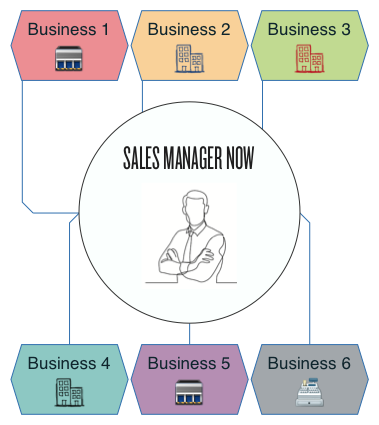Our firm began practicing fractional sales management in early 2006, and nearly 20 years later,…
Accountable Sales Environments Require Clear Expectations
When accountability is lacking in a sales team, many leaders will resort to micromanagement and mistrust. However, this is the opposite of what’s needed to develop an accountable sales environment. Instead, leaders who want an accountable sales environment will be relentless in clarifying expectations. Sales leaders should examine if they’ve clearly documented and shared what is expected of the team. And then they can ensure the team understands and is following those expectations.
Clarify Expectation Details
It’s impossible to create an accountable sales environment if your team does not clearly understand your expectations. Yet, in most small businesses it is more common to leave out clarifying details and instead share general or vague expectations. For example, if I tell my team that sales reports should be turned in by Friday, what exactly does that mean? Does that mean Friday morning, by end of business, or by midnight?
If I verbalize that expectation rather than documenting it, I open the door for a dispute over what I actually mean. We as people tend to hear what we want to hear. And we believe we’ve said what we intended to say. Without it being recorded, we’ll never know for sure…which can lead to trust problems. Instead of a well-oiled, hard-working accountable sales team solving selling problems, the team wastes time reviewing old, unclear expectations and missing the mark. Does any of this sound familiar?

You’ll Need to Investment Time
Creating an accountable sales environment requires an investment of your time and thoughts. When you do this right, you won’t have to continue redoing it. The result will be an accountable sales team spending more time on the high-payoff activity leading to increased sales. The healthy pressure of meeting expectations will be where it should be; on the teams’ shoulders. The shoulders of accountability.
At Sales Manager Now we focus on three areas to help ensure we have transferred our expectations in a manner that leads to an accountable sales team. Firstly, we document. Secondly, we focus on sharing in a way that is clearly understood. Lastly, we monitor indicators that confirm the team has owned the expectations. That is when we know we have been accountable for our responsibility in creating an accountable sales environment.
This blog will contain the three areas in print as well as three short videos to make it easy for you if you care to listen later. If you find this useful, please forward it to others as we’ve done the hard work of creating the content, all you need to do is forward.
7 Fundamental Sales Expectations to Document
Every company has its own policies, guidelines, or procedures which are all expectations to clarify. But all sales teams should have the following 7 fundamental sales expectations documented to establish your company’s accountable sales environment.
-
Job Responsibilities
So what are they? The Entrepreneurial Operating System or EOS, explains the Five Fundamental Responsibilities. You want to make sure your Five Fundamental Responsibilities are clearly documented and of course, those should be included in your job description. -
Target
You want to document your target customer or client. Who is that ideal client or customer you’re looking for? Go for the best. It doesn’t mean you can’t have an A, B and C-type of client, but you want to definitely have your ideal client documented so it’s very clear. -
Qualifying Criteria
Now that you found that ideal client, which one should you work with? How do you know if it’s worth investing time? What qualifying criteria should your salespeople be discovering to know if they should invest more time in the sales process? -
Sales Process
Document the sales process so you can manage improvement. If everyone isn’t doing the sales process similarly or identically, then it’s hard to see where you should tweak any areas to make improvements in your process and communication. -
Activity
What sales activity should your salespeople be performing? -
Goals
What are the specific goals and results you’re looking for from your sales people. Document goals and the results you want. -
Department Guidelines
Document your department guidelines if you want to stop having fire drills or internal conflict with your sales department. Included in the documentation could be territories, how to handle mergers and acquisitions, sales promos, anything that at times can be ambiguous and create conflict.
Three Stages to Have Your Sales Expectations Understood
If you’ve taken the time to clarify and document your expectations you’ll want to use the following three stages to keep moving toward your accountable sales environment. These three stages will transfer the expectations from you to your soon-to-be accountable sales team.
1. Document
We covered that in the last video as far as what you should document. But why is documentation important? It is to have a common agreed-upon understanding. I have people I work with that do nothing but verbal instructions and they tend to have to do the same instructions over and over again. They get very frustrated that people don’t get what they’re saying. The reason for that could be poor delivery. On the other hand, people can only absorb so much verbal instruction.
Another benefit of documenting is you can save time by leading people back to the documentation when they are unclear. As an example, if someone is asking about a particular policy or how they should work through a process, you can say, “Go ahead and take a look at the Qualifying Criteria doc and let me know if you have any questions on that.” Now you’re not repeating yourself over and over.
2. Explain
You want to explain things thoroughly. Rather than emailing instructions or expectations to someone or reading it to them in a meeting, you want to sit down with them with the intention of explaining and answering questions. Give them the information and give them time to absorb it. Don’t be too quick to just say, “All right. So this is the policy. Any questions?” Because they haven’t absorbed it yet. They don’t know what they don’t know. Give them time to think it through. Go through that explanation process slowly, cover any questions, and clarify things.
3. Monitor
Now, you’ve documented and you’ve explained your expectations clearly. You’ve given your team time to ask questions. You’d think they’d understand it by now. Not necessarily.
This is important. If you really transfer what your expectations are to someone and they own it, now they’re just doing the work. You’re no longer guiding them. You’re coaching them in what they need to do and what they want to do now, which is fulfill expectations.
You want to monitor these expectations of your sales team through accountability records and charts and also in weekly and monthly meetings. You want to repeat the expectations for a while. You’ll sound like a broken record. In addition, you want to reference the documented expectations. Like I said earlier, “Go see that document. Take a look. What is it telling you? Is there something missing in that document?” Make them find the problem in that and then tighten it up.
7 Indicators That Confirm Your Accountable Sales Environment Is In Play
When you are creating an accountable sales environment, there are 7 indicators for you to keep an eye on and monitor to verify if transference of your expectations has taken place. Accountability starts when people own what the expectations are. That’s when they can hold themselves accountable. Most of the indicators will require you to listen and observe your team in your sales meetings and conversations. So, let’s go over those seven indicators for you.
-
Find your people solving the right problems
They’re not just solving any problem or not solving any problems at all. They’re solving the right problems because they understand what the expectation is. And so, they’re more focused on attaining their goals and meeting expectations and solving the right problems. -
You see an increase or an improvement in goal attainment
They’re either improving their results or they’re retaining their results. -
You hear your team talk about goals
For instance you may hear them say, “I’m almost to my goal. I hit my goal. Or, I don’t know if I’m going to get there.” You may notice anxiety showing up. Now you know they’re thinking about the expectations and they know what their job is. -
There’s a greater awareness if they’re doing their job well or not
This helps when you have someone that doesn’t fit. Now that expectations are clear, it’s easy to see if they’re not meeting those expectations and don’t fit. If you need to address that and they need to find a different position, it makes it easier to address. -
Your team will start confirming their understanding of your expectations
You can ask them the question, “So what is your goal this month?” And they tell you what it is. You can also ask them, “Have you met the particular qualifying criteria?” And they explain what those criteria are and tell you that they have. Now you’re confirming. -
Your team will start asking you more clarifying questions
Now they know that you’re going to monitor and measure the clear expectations you have set for them. You will notice they are becoming better students of “What do you mean?” “So do you mean A or B?” “When does that need to get done?” You’ll be getting more accountable and clarifying-types of questions which is a great indicator. -
You’re going to see a stronger emotional investment
Your team is going to be excited when they attain their goals and meet expectations. On the other hand, they’re going to be disappointed when they don’t. Your team may be stressed out in the middle of the month. Before you set expectations, you were carrying that stress for them. Now you don’t have to; they will carry that for themselves. Instead, what we as leaders should be stressed out about is not setting or clarifying expectations, and monitoring the indicators.
When you take the time to be thorough and are committed to having your expectations not only shared but also followed, you will have set the foundation for your accountable sales environment. It’s then time to let your accountable sales team to work on meeting those expectations.
Subscribe to my YouTube Channel




[…] others and communicate it clearly and confirm their understanding. Are we holding up our end of creating an accountable environment or simply expecting to have […]
[…] can have the best sales team but if they lack accountability they will be ineffective. Everyone needs to be in agreement with the expectations of the sales team […]